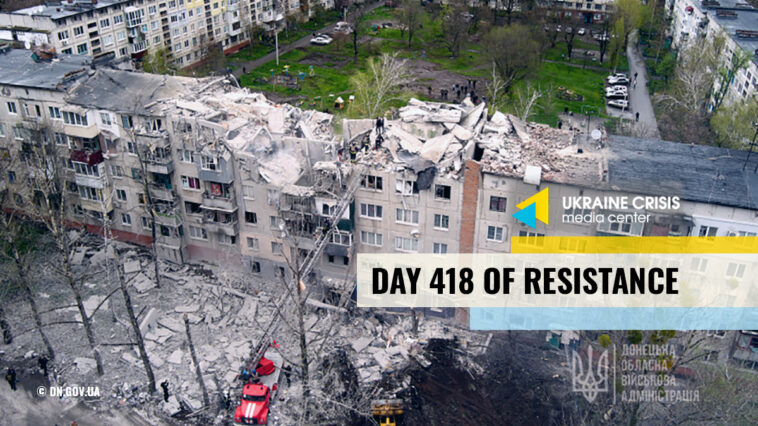Death toll from a Russian missile strike on Slovyansk rises to 15. One of the victims is a two-year-old child. Slovakia has completed the transfer of all of its 13 MiG-29 fighter jets to Ukraine. Ukrainian war prisoners offer testimony of torture in Russian captivity, Ukrainian Parliament Commissioner for Human Rights says. He says his office has dozens of videos where the Russians execute Ukrainian service members.
Russian missile strike on Slovyansk on Easter Eve kills 15
On the afternoon on April 14, a Russian missile strike hit residential buildings in Slovyansk, in Donetsk region. There were at least seven missile impact sites, city authorities said. Russian forces fired S-300 rockets.
The attack left 15 people killed, including a two-year-old boy, and more than two dozen injured. A Russian missile strike on Slovyansk damaged 34 apartment buildings, 20 private houses, and 12 cars, Ukraine’s Interior Ministry said.
Slovakia completes transfer of 13 MiG-29 fighter jets to Ukraine
Slovakia has delivered all of the 13 MiG-29 fighter jets that it promised to Ukraine, the Slovak Defense Minister Jaroslav Nad said on Monday.
The minister said the warplanes were transported overland for security reasons in “an important and complicated logistics operation.” He also thanked everyone involved in the transfer.
On March 23, Slovakia sent four Soviet-designed MiG-29 fighter jets to Ukraine, which makes it the first NATO member to do so. The planes are already deployed to protect the skies over Kharkiv, Vice Speaker of the Ukrainian Parliament Olena Kondratyuk said in a Facebook post Monday.
Eighty-six per cent of Ukrainian war prisoners tell of torture in Russian captivity, Ukrainian Parliament Commissioner for Human Rights says
Eighty-six per cent of Ukrainian service members that return from captivity denounce physical torture, Ukrainian Parliament Commissioner for Human Rights, Dmytro Lubinets told “Ukrainska Pravda” in an interview. “We start legal cases after each Ukrainian service member returns from captivity, and record facts that speak of inhumane treatment of war prisoners. According to our data, 86 per cent of the released prisoners report physical torture. The UN Human Rights Monitoring Mission in Ukraine has similar findings. Their reports show similar numbers,” Lubinets said.
The commissioner refused to give details of the ill-treatment. After Ukraine government members publicly expose the facts, “the Russians begin to treat Ukrainian war prisoners even more cruelly,” Lubinets explained.
Office of Ukraine’s Human Rights Commissioner has “dozens of videos” where Russians execute Ukrainian service members
“This includes cutting off the head, cutting off genitals, ears, nose, limbs, and fingers. Some [of the Russian soldiers committing executions] have been identified. I know that one person has been punished (they were killed in combat with Ukrainian troops),” Ukrainian Parliament Commissioner for Human Rights, Dmytro Lubinets said.
There are several reasons why Russia makes the videos circulate on the internet, Lubinets added.
The first one is “to fuel anti-Ukrainian hysteria” among the Russian public. The second reason is to convince Russian soldiers not to surrender to Ukrainian troops, implying that “they will kill you like this, if you surrender”. The third reason is to intimidate Ukrainian forces ahead of the counteroffensive.
Ukraine resumes electricity exports to Slovakia, continues to export to Moldova, Poland
As of April 17, Ukraine produces enough electricity to cover its domestic needs. The system has a large reserve of capacity, so Ukraine begins to export electricity to Slovakia, Ukrenergo, Ukraine’s national energy operator said.
The export volume to Slovakia stood at 200 MW per hour, Ukrenergo said. Ukraine also continues to import a small amount of electricity from Slovakia (with imports varying from two to four megawatt per hour).
The country continues to export electricity to Poland (75 MW per hour) and Moldova (99-134 MW per hour).
Ukraine is experiencing spring flooding, Ukrenergo said. The water levels are much higher than in the past years. Hydroelectric power plants operate around the clock. Waters are released to lower water levels in the Kyiv and Kaniv reservoirs and to minimize the consequences of the flooding.
Electricity supplies along the frontline remain difficult. On Sunday, Russian strikes on Kherson damaged power lines, causing power outages in parts of the region and in the city. The power supply was quickly restored.

